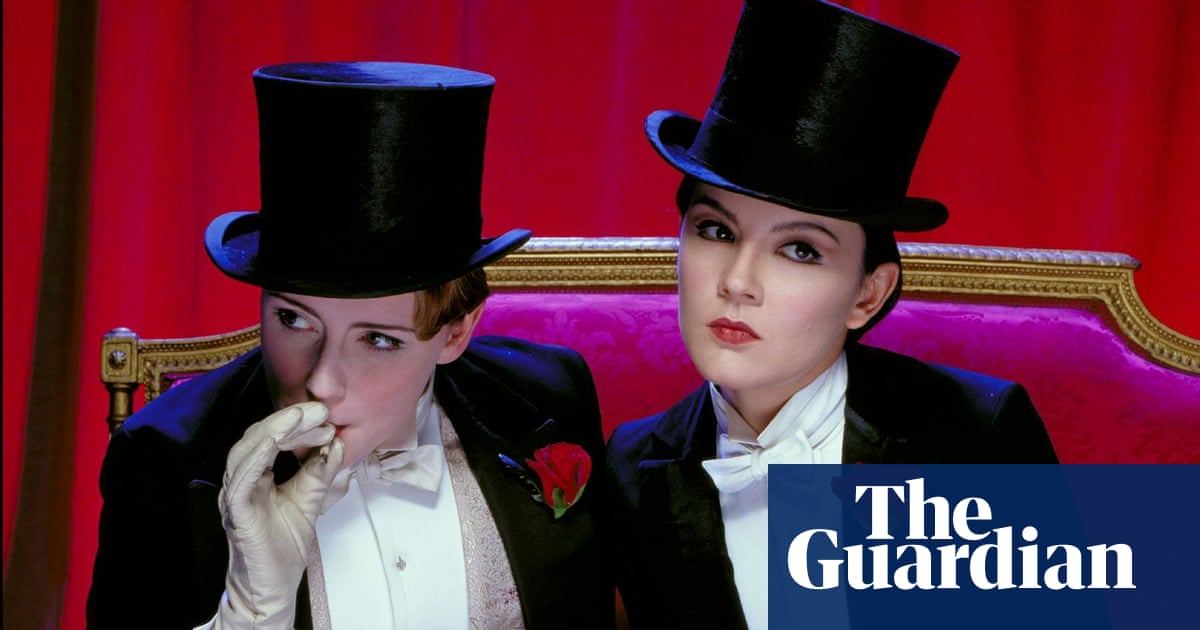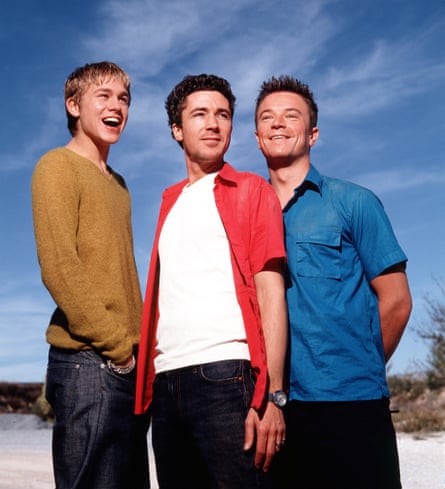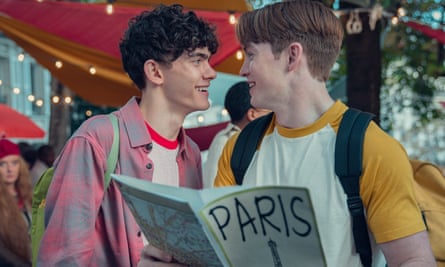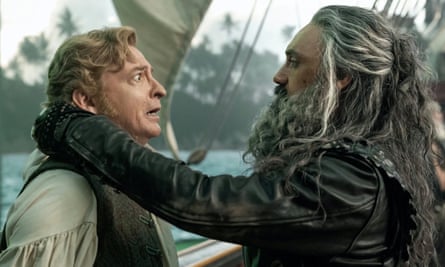Top of the Pops
Week after week, we saw, with our parents, Boy George, Freddie Mercury, Jimmy Somerville, Marc Almond, Erasure, Frankie Goes to Hollywood, Divine, Dead Or Alive … They were not only putting gay culture in primetime family viewing, but also creating terrific, innovative music. Andy, 55, London
Will & Grace
Although the name was Will & Grace, I watched it for Jack & Karen. It was the first sitcom I saw where a gay man was depicted living life unapologetically – seeking love, getting married, having sex, working, having a family, building relationships and living without the constant drama associated with our community. I know the show had problems, like straight men playing gay men, stereotypical representation, almost no characters of the LGBTQ+ and so on – but it was a phenomenon. I live in Brazil, where the LGBTQ+ representation on TV 25 years ago was restricted to characters on comedy shows who were ridiculed. Will & Grace showed me a reality that was as far from mine as the moon is from Earth, but I saw some hope there that my life could be more than living in shadows and ghettoes, or being comic relief for the straights. I’ve always wanted to have a rich friend, too – but I never found my Karen. Zed Martins, 46, Brazil
Tipping the Velvet
Tipping the Velvet was huge – not only were lesbian characters the main characters rather than a token addition, but the historical setting was an important reminder that LGBTQ+ people were nothing new, that there was a long history of gay experience, and it was refreshing to see that reflected – with a happy ending! Clare, 40s, Cambridge
The Times of Harvey Milk
The very early Channel 4 show In the Pink was a series of films about and by LGBTQ+ people. The Times of Harvey Milk gave me the courage to come out. It is hard to remember how little information about LGBTQ+ issues was in circulation in the 80s – we had nothing and the media were full of Aids and hate. Against this, In the Pink was more than a breath of fresh air, it was freedom. I was a 21-year-old divinity student from Orkney attending Aberdeen University and on sabbatical in the students’ representative council. I was locked up in my own internal struggles about being Christian and gay. The Times of Harvey Milk was a documentary about the first out gay man to hold elected office. He was assassinated by a colleague who was only convicted of manslaughter because of his fast food addiction. Milk became my hero, a martyr whom I could unconditionally admire. His example gave me the courage to take the last step out of the closet door and, for the first time in my life, be honest. Tim Morrison, 58, Orkney
The Fosters
‘It showed our kids a mirror of their own family’ … Teri Polo and Sherri Saum in The Fosters.The Fosters is a show about a married lesbian couple raising five kids: one biological child and four adopted/foster children. Our family watched it together every week – my wife and our three children. Our kids are all now young adults and they still watch reruns. It showed them a mirror of their own family (albeit a dramatic soap opera version) and that made them and us feel like we were not the only two-mum family on the planet. Our eldest son wrote about the impact it had on him and his siblings in his film school applications (now a graduate – yay!). We all know every word to the theme song. Amy Franklin-Willis, 52, California, US
It’s a Sin
It’s a Sin – another Russell T Davies masterpiece: keeping the conversation around Aids/HIV current, celebrating queerness in all its ways with empathy and integrity. Watching the series was a harrowing but life-affirming five hours that was a testament to the bravery, solidarity, joy and pain that queer communities have faced for generations. It’s a Sin was a timely reminder that queer erasure and stigma is an ongoing struggle, and the parallels between the government rhetoric surrounding gay men in the 80s is disturbingly close to current rhetoric being employed in relation to trans/non-binary people today. A wake-up call for older and younger generations alike. Martha Benedict, 25, Wales
Queer As Folk
‘I felt we’d arrived – with a bang!’ … Charlie Hunnam, Aidan Gillen and Craig Kelly in Queer As Folk. Photograph: Channel 4Queer As Folk was the first drama that represented an unashamed and accurate picture of real gay people’s lives, good and bad. To a large extent it was what my life had been, except the characters were a lot braver than I had been. The show was fun and stuck a real finger up at the bigots in society. Finally, I felt that we had arrived: with a bang! Ian, 69, Leeds
Gimme Gimme Gimme
Gimme Gimme Gimme had a profound effect on me when I was a teenager. Tom and Linda were hopeless and were not cool. But neither was I. Here were two people living in London, working, going out and meeting people, trying to find love. I wanted to have as much fun as they were, be independent and live my life as I chose. Queer As Folk was revolutionary, but did not seem attainable to me, whereas Gimme felt like a place my life could get to. The show stays with me and I still regularly quote it. The charm of Tom and Linda has not faded and I am grateful to them both for showing me a life that was possible. Jack, 40s, London
Neighbours
This may be controversial, but my first thought was the beloved Australian soap Neighbours! Georgie Stone plays Mackenzie: she contacted the show a few years ago to ask why they didn’t have a trans character, and got the job. The show has included trans storylines, but has also shown Mackenzie as a normal young woman, an accepted and loved member of the community. When Australia legalised same-sex marriage, a storyline was introduced where two characters, Aaron and David, got married immediately. They went on to have a child, and show how natural it is for gay couples to bring up children. The show continues to have gay, lesbian and bisexual characters. What I love about it is that their sexuality isn’t their all-defining characteristic. They are complicated, interesting, flawed and wonderful people, just like everyone else. And obviously, they are also good neighbours! Teresa Sadler, 54, Worcester
skip past newsletter promotionSign up to What's On
Get the best TV reviews, news and exclusive features in your inbox every Monday
after newsletter promotion
Heartstopper
A revelation … Joe Locke and Kit Connor in Heartstopper. Photograph: Teddy Cavendish/Netflix/See SawHeartstopper, based on the graphic novels and novellas by Alice Oseman, was a revelation for me. Events similar to those from my youth helped heal some longtime sadness; it moved me beyond words and it shows that being gay, bisexual or asexual doesn’t mean you are a freak – you’re just a real person with everyday problems. There was no representation like that when I was the age the characters are. Rare was the portrayal of a character whose sexuality was not their defining trait. I hope the books and TV series have helped others as much as they have helped me. Ian Jasper, 59, Ipswich
Oranges Are Not the Only Fruit
Growing up, there was very little gay representation. For gay women, it felt like there was even less, as any gay representation was often geared towards gay men as the more acceptable face of being gay. I came out very late but now realise why this TV series felt so important to me. Looking back, if social media had existed, reading other people’s reactions would have been a positive experience for me. Unfortunately, I felt so confused I suppressed those feelings and dismissed them. Although sometimes tragic, I still look at that TV series and think how brave it was to produce it all those years ago. Perhaps not seismic in terms of influencing change at that very moment, but it was important to me. For a confused woman, it felt as if I could relate to some of it. In an unconnected world with few friends, it is something I will never forget. Sarah, 52, London
The L Word
The L Word took us from nil representation to the majority of characters. Not perfect, but groundbreaking. It focused on women, diversity, family; chosen family and parenthood; love and loss. It provided escapism but also reflected truthful struggles, situations and characters that you have seen or have known. It wasn’t mainstream, but it was culturally significant, despite including some lazy plots and problematic trans representation. Suzanne, 41, Kent
Tales of the City
It portrayed gay, lesbian – and, importantly, a leading trans character – living in society alongside their straight friends, not in a ghetto. It’s warm, funny, not glamorised, and the LGBTQ+ characters don’t all die in the denouement. Mark E Allinson, 56, London
Our Flag Means Death
So refreshing … Rhys Darby and Taika Waititi in Our Flag Means Death. Photograph: Aaron Epstein/HBOIt was refreshing to see a show where homophobia wasn’t the main focus. Queer characters just living in their own bubble, finding each other as their new family, and accepting each other no matter what. It’s funny and exciting, and in the focus there is a love story, but it’s handled like any love story. Just two people on love, which is beautiful. We need more stories where being gay is not there for shock value or a laugh. It is a major shame it got cancelled before their story was fully told, but the fanbase’s response truly shows how important this show is for so many people. Bettina, 32, Crewe
RuPaul’s Drag Race
‘I didn’t know you could even be queer or trans until I saw it’ … Gothy Kendoll on RuPaul’s Drag Race UK vs the World. Photograph: Guy Levy/BBC/World of WonderI grew up in a very conservative home and town. I didn’t know you could even be queer or trans at all until I saw RuPaul’s Drag Race. Positive queer representation helped me accept and love my own identity, something I am still coming to terms with. We need shows that depict queer people as people, because when I was growing up my biggest fear was being called gay in school. Now I’m afraid of ever being called straight. Willard, 29, Indiana, US
This Life
This Life was a huge revelation to me as a young gay kid in the process of coming out and being outed to school and family. The freewheeling, successful and open representations of a gay man and his unlikely and ridiculously fit lover were radical to me. I can remember secretly watching it and feeling, in part, the guilt and shame take a back seat for a moment. Andrew F Giles, 44, Spain
∎




